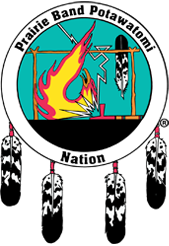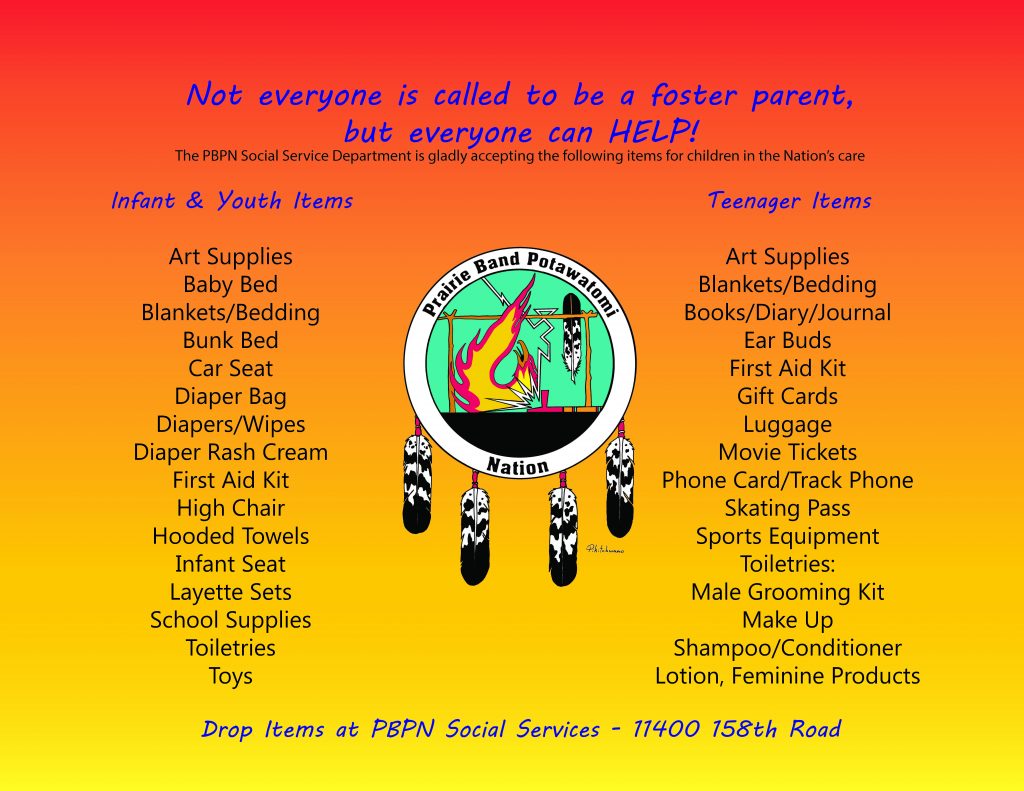785-966-8331
Mission
To protect children and families while supporting connection to culture, customs, and community.
Eligibility
Children who are a member of the Tribe; is eligible for membership into the Tribe; is a natural or adopted child of a member; or is a grandchild of a full or part-time custodial grandparent. Reside within the PBPN Reservation or in the surrounding area.
Based on tribal code: 6-1-3,B
Services
1. Family preservation services include culturally sensitive services to families in crisis who are at an elevated risk of tribal children going into out of home placement on the PBPN Reservation . Family preservation services include intensive in-home interventions that address the issue that puts the family at an elevated risk for out of home placement, participation may be brief or may continue for a longer term, based on the needs of the family. These services may be court ordered, requested by the family, or recommended by Local or State courts. Social Services may request therapeutic services based on the need of the family to help deter from ongoing crises. The PBPN social worker will provide crisis planning as needed. The primary goal of family preservation is to maintain the family unit, preserve tribal connections along with education for the family to promote self-sufficiency as long as the caregivers are willing to participate in the services.
2. Family services is when a tribal family on the PBPN Reservation is in need of services and the specific needs of the family do not require the higher level of intensity of Family Preservation, staff may provide Family Services to connect families with community resources.
3. Child protective services include culturally sensitive investigations of abuse and neglect reports on the PBPN Reservation . CFS staff work closely with community agencies and members to help identify individuals in need of services. CFS collaborates closely with Tribal Police when investigating reports of maltreatment in our community. CFS social workers begin their investigations in a quick and timely response based on the severity of the concerns reported. Based on their findings, the situations are assessed for appropriate service referrals.
Report of Child Abuse and Neglect
Please email to intake@pbpnation.org
4. Foster care services are culturally competent services to children and families in need of foster care. The primary goal of foster care services is to support the children and families in long term reintegration efforts. Case management services are provided by social work staff and a family support worker to assist the family during the reintegration process. Other services include case planning, close collaboration with the court to provide current progress of the case, assistance with child care costs, referrals to other community agencies as appropriate.
5. Independent living services are culturally competent services that assist youth in foster care or former foster care youth, ages 14-21 make a successful transition from foster care to self-sufficiency. Services provided will promote youth’s independence, including subsidy, adult education classes, independent living classes, drug and alcohol addiction awareness, domestic violence prevention counseling, budgeting, healthy relationships, assistance with obtaining job skills, how to seek and utilize community resources, educational services including postsecondary and training vouchers, vocational services, classes to include basic sewing, cooking and shopping techniques.
6. Adoption services are culturally competent home study, case management, post placement assistance and adoptive parent education.
7. ICWA services include closely monitoring services to ensure active efforts are being provided to PBPN children in custody of State courts nationwide. The primary goal of ICWA services is to prevent the breakup of Indian families and to support cultural values of the child and family.
8. Foster care recruitment services include the identification of new foster home/families, recruitment of foster home/families and train families to become licensed foster care providers.
9. Foster home licensing includes Foster Homes and Kinship Placements on the PBPN Reservation. Services include background checks, Child Abuse and Neglect Registry check, family assessment, Trauma Informed Partnering for Safety and Permanence – Model Approach to Partnerships in Parenting (TIPS-MAPP), Deciding Together Training, in-service training for foster parents and on-going monitoring.

